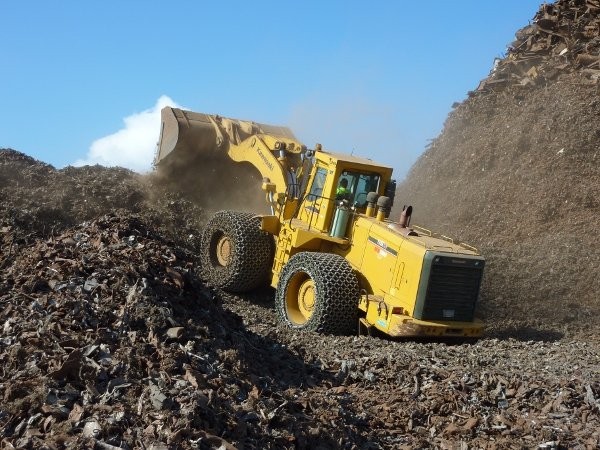OneSteel Recycling has the recipe for success in scrap with the help of a Kawasaki 115V

OneSteel Recycling, Inc. is the U.S.-recycling division of Australian-owned OneSteel, that country’s largest vertically integrated steel company. With locations in Virginia, Maine and Florida, the U.S. division offers a variety of services including site cleanup and industrial-metal waste collection as well as static and shear baling. The company’s Tampa, Florida site also includes a 6,000-horsepower shredder, a separator and a port. Most of their ferrous materials are exported while non-ferrous materials are primarily sold in the U.S. OneSteel, the parent company, is quite widespread, with additional operations in Australia, New Zealand, Canada, Mexico, Peru, Malaysia, Thailand, Indonesia, the Philippines and China.
OneSteel says scrap is a dynamic, multi-faceted business. It has to be located, purchased, ingested, separated into ferrous and non-ferrous, and then shredded or baled. And brokers need to be consulted, buyers located and materials shipped. Each step has its own challenges and complexities, and as the industry has matured so have the resources that make it safer and more uniform. OneSteel says a leading resource for them is the U.S.-based Institute of Scrap Recycling Industries.
“ISRI facilitates much of the broker relationships and legislation,” explains Joe Petti, U.S. Environmental Health and Safety Director for OneSteel Recycling. “We are very happy they are here. Thanks to them, you are not just one scrap company. They give us a voice. They fight for all of us and for the business in general.”
Product support is critical
Keeping all of OneSteel’s Tampa equipment running in top shape is a tough assignment – thanks to Florida’s legendary humidity, salt and heat – not to mention the unforgiving nature of scrap itself. The company’s two Sennebogen material handlers in particular, with their 10-ton Bateman grapples for ship loading, take a real beating. Providing service to those two machines is GS Equipment (GSE), which also happens to be the area Kawasaki dealer.
When it came to the wheel loaders they had been running, OneSteel was feeling frustrated with the long-distance phone support they were receiving. Yet they were pleased with the local support GSE was providing. When it came time to replace one of their wheel loaders, OneSteel was open to learning more about Kawasaki.
“Our purchasing the Kawasaki 115ZV-2 wasn’t so much a sales pitch from Kawasaki than a testimonial from JVS Contracting, a local demolition contractor, as well as our own mechanics,” explains Tommy Quirke, President, OneSteel. “GS Equipment has taken very good care of us. Since they are a Sennebogen dealer as well, it makes it easier – a one-stop shop. When it comes to equipment buying, I go by what my guys tell me. They are very pleased with the power in the Kawasaki.”
OneSteel did make several custom alterations to their 115ZV-2. They extended the bucket a foot on each side to hinder scrap getting underneath their SETCO solid tires, and they added chains to extend tire life. Plus, they added a centre support to the bucket so it could more easily move their 10-ton Bateman shipping grapples.
“That was one of the selling points for us about the Kawasaki,” notes Quirke. “It could move those grapples around for us.” Luis Garivdi, who operates the Kawasaki 115ZV-2 says he couldn’t be more pleased. “The Kawasaki has lots of power!” he says. “I noticed that right away. With the addition of the centre support for lifting, we can now move a grapple in just 10 minutes and position it exactly where we want to. It used to take an hour.”
Adds Quirke; “Luis really takes care of that loader. He runs it, he keeps it pristine. That’s hard to do, because it is nasty out there. Dealing with the ship, the dirt and dust, I know the reversible fan has really helped.”
Safety first
OneSteel is a strong proponent of safety. “It’s all about behaviour,” says Petti. “And it starts at the top down. Every Thursday morning at 6:45 we have a company-wide ‘Toolbox Talk.’ Tommy, our President, leads 50 percent of them. And if he’s travelling, he still attends each one. We’ve had lots of praise from DuPont, and they are the leader in safety. They’ve said that of all the accidents, incidents and injuries, 96 percent can be attributed to behaviour; only four percent are actual conditions.”
In addition to ToolBox Talk, OneSteel has put in place four “life-saving principles”: Can’t See, Can’t Load or Unload; 5 MPH Speed Limit; No Stored Energy; and People Will Not be Exposed to Mobile Equipment. On a practical level, this means the public is not allowed to do their own off-loading. Drivers are escorted to a waiting zone complete with water, beverages, wet towels and fans, then escorted out after their vehicle is off-loaded. It means objects that can fall are stored safely, scrap piles are monitored so the face won’t tumble down and lockout/tagout measures are instituted.
OneSteele’s “life-saving principles” also mean that every piece of mobile equipment has a yellow and a green light – yellow means the equipment is operational and people need to stay away; green indicates it is safe to approach.
“We’ve done that at all of our USA locations,” explains Petti. “Mobile equipment is one of, if not the number one hazard to those who come into our yards. We take safety very seriously.”



